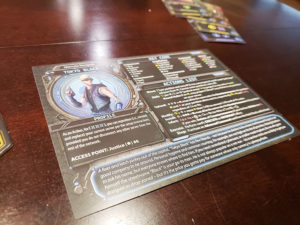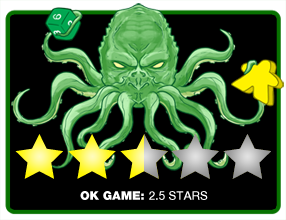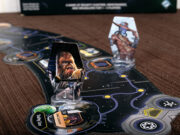 Phil Eklund is a game designer (not this game’s designer) who enjoys producing complex games. Usually the physical mechanisms are not so complex, but the intricacies to arrive at decisions and compare options are heavily burdened with jargon and references to subsections of rules that require multiple attempts at analysis. This activity alone creates a certain feel to the game that players won’t soon forget, and to be honest, may very well enjoy.
Phil Eklund is a game designer (not this game’s designer) who enjoys producing complex games. Usually the physical mechanisms are not so complex, but the intricacies to arrive at decisions and compare options are heavily burdened with jargon and references to subsections of rules that require multiple attempts at analysis. This activity alone creates a certain feel to the game that players won’t soon forget, and to be honest, may very well enjoy.
Readers should keep the above in mind as this review unfolds. Renegade is a game about hackers infiltrating a large computer system known as the SMC. It’s primarily a deck building game with elements of area control and pick-up and deliver with a cooperative goal. Renegade provides 1-5 players 90 minutes worth of game and, ironically, two players or less is this reviewer’s preferred player count.
Gameplay Overview:
When a game of Renegade begins, players will be choosing the SMC (Super Massive Computer) they wish to go up against. This requires choosing a card which has some scenario rules and selecting 3 goal cards (Copper, Silver, Gold) which provide progressively difficult objectives. The board is prepared with each player’s hacker pawn placed on separate starting server partitions (spaces) along with some tokens representing player utilities to attack the server and black tokens for the server’s defenses.

Each round of the game allows each player 3 turns of card play. On a turn, players will play their hand of cards and then draw back up in standard deck building style. There’s a shop to buy new cards, which are usually more efficient or powerful than the starting cards. When players do this, they are required to trash a card so that decks always stay at the starting count of 15 cards.
As players take their turns, a variety of actions will require them to spend Command Points, which are produced like Mana as cards are played. For example, to place a new Contaminant (token) of a certain color requires 3 Command Points of that color. That token then aids the players in a variety of ways in their actions. Other Command Points allow players to move across the board, move tokens around (their own or the SMC’s), or create new tokens. All of these tokens have a connection to the theme which is referenced heavily throughout the rules.
Players win the game by following the goals set out on the selected SMC cards. If those goals have been completed, the players win. If not, usually some punishment of additional server defenses are added to the board and the game continues.

Game Experience:
In a nutshell, Renegade feels like an advanced version of deck-building Pandemic where actions are dictated by how a player’s Command Points and card options work out. There is a high degree of strategy and planning amongst players and turns can be a deep discussion of options for the round. Since every player sees all the cards in their deck every round before the enemy server actions are completed, a player’s tactical decisions matter heavily in coordination with their overall deck strategy.

This can also doom players if needed actions, such as attacking server defenses, aren’t possible with the combination of cards drawn. Flexibility and adaptability are needed, but then again, players are at the mercy of the cards available for purchase as well. If the objective cards require actions that just aren’t efficient based on the current decks of the players, and if better cards aren’t available from the shop, they’ll have to wait and suffer until they can make some turns work.
However wonderful and engaging this sounds, dear reader, this review needs to discuss the biggest issue that Renegade has going against it: the rules. Since you’re currently choosing to evaluate this game by reading a review rather than (or maybe in addition to) watching a video, we’ll assume you might enjoy reading a game manual or two. As a reviewer, yours truly expects that games can be learned from the provided components alone unless the manual refers to an online teaching aid. Since that isn’t referenced, you’re left with the text from Victory Point Games.

Rarely has this reviewer seen a more sleep-inducing, mind-numbing, and overly complex manual for a game. Cluttered throughout the text are symbols which create a cacophony of ideograms that distract from relatively simple concepts that could be explained in much clearer ways. The overloaded use of jargon and terminology only familiar to a seasoned player asks too much of first-time players and more often, a new player will be rewarded by being taught the game from its owner rather than having to read the rules.
In addition, the iconography of the Command Points and actions has no relationship to the meaning of the symbols. Constant reference to the rules and actions was necessary on almost every turn. So much of this could have been simplified with more accessible Euro-game style iconography.

At the end of it all, the entire experience of enjoying the game is marred by this retreat to the weight of text over graphic design and further blind playtesting. It created such a headache of an experience that it’s far more easy to find and recommend more accessible games than to belabor what really amounts to a cooperative deck builder with an over-egotistical hacker theme.
The paragraph at the beginning of this review is of note for this reason. Phil Eklund’s games are complex and deserve a complex manual. Renegade is not a complex game. The weight of reading the manual is just inconsistent and, although it may seem forgivable in an era of video instruction, this was enough of a distraction to really earn this reviewer’s ire.
Final Thoughts:
Renegade keeps itself on the shelf not for any weakness of game mechanisms, but for the sheer fact that teaching it and referencing the manual is a headache. Games with better iconography exist. Games with a higher degree of accessibility exist. The weight of actual actions in play is completely out of step with the complexity of learning the game. The payoff in the gameplay of Renegade is just not delivered based on the time investment required. However, as a solo game, it’s fine.
Final Score: 2.5 Stars – Play it solo or with a patient partner if you love the theme and love challenging puzzles like Pandemic.
 Hits:
Hits:
• Challenging, puzzle solving play
• Lots of strategic and tactical choices
Misses:
• Overly difficult to read manual
• Can suffer some randomness which leads to a quick losing
• Difficult to teach without any player aids























I’ve read it several times, but I still don’t get it: what has Phil Eklund to do with this game?
Let me apologize first if my perspective on this was not clear. Phil Eklund’s games deserve complex rulebooks because his games ARE complex. Renegade does NOT deserve a complex rulebook like it is. It feels intentionally over embellished with jargon just to serve a theme and doesn’t help the reader learn the game. Ultimately, the game is NOT complex.